Filter by

Managing the digital university: paradigms, leadership, and organization
The reflection on university management is based on the question about the shape of universities of the future. Civic, responsible, sustainable, virtual, digital, and many other universities can be mentioned among the concepts present in the literature. All these names describe an important distinctive feature of a university, which will gain more and more importance in the future. However, giv…
- Edition
- -
- ISBN/ISSN
- 9781003366409
- Collation
- x, 286 pages ; 24 cm.
- Series Title
- Routledge studies in organizational change & development
- Call Number
- 378.1 SUL m

Decolonising Higher Education in the Era of Globalisation and Internationalis…
Conceived within a context of transdisciplinarity and pluriversalism, and in rigorous response to the Eurocentric, globalising and nationalising structures of power that undergird and inhabit contemporary praxis in higher education – especially in African higher education – this collection of essays brings to the on-going discourse on decolonisation fresh, rich, probing and multilayered per…
- Edition
- -
- ISBN/ISSN
- 9781928424277
- Collation
- x, 293p. : ill.
- Series Title
- -
- Call Number
- 378.68 DEC d
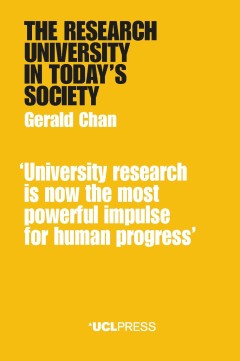
The research university in today's society
In this topical lecture, investor and philanthropist Gerald Chan examines the role of philanthropy in the rapidly changing higher education environment. He proposes that society will be short-changed if the purpose of universities is seen as human resource rather than humanity. Dr Chan argues that the independence of universities is crucial for maintaining the balance between their dual role as…
- Edition
- -
- ISBN/ISSN
- 9781911307600
- Collation
- 28p. : ill.
- Series Title
- -
- Call Number
- 371.206 CHA r
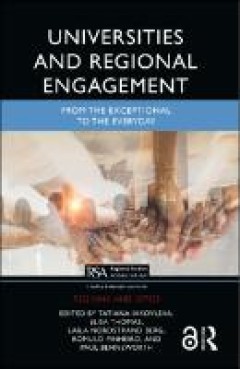
Universities and regional engagement : from the exceptional to the everyday
The study of universities’ role in regional engagement has traditionally been focusing on exceptional cases. This book presents a reconceptualision which embraces its underlying complexity, and proposes a roadmap for a renewed research agenda. Starting from the grassroots level of universities’ "everyday" engagements, the book delves into the manifold ways in which university knowledge agen…
- Edition
- -
- ISBN/ISSN
- 9781003150299
- Collation
- xiv, 246 p. : ill.
- Series Title
- -
- Call Number
- 378.103 IAK u

A global history of research education : disciplines, institutions, and natio…
This book’s chapters contain a mix of analysis and discussion looking in depth at the history of higher education. This text presents a global history of research education in the nineteenth and twentieth centuries. Chapters cover topics such as how disciplines are formed and research training, the rise of academic laboratory science, research mathematicians circa 1900 and research training i…
- Edition
- -
- ISBN/ISSN
- 9780192844774
- Collation
- IX, 387 p.
- Series Title
- History of Universities
- Call Number
- 378.009 GLO g
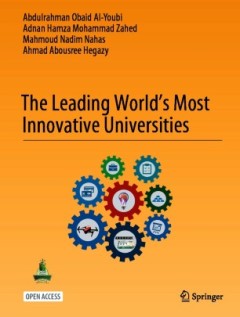
The leading world's most innovative universities
This open access book is unique in its contents. No other title in the book market has tackled this important subject. It introduces innovation as a way of practice for world-class universities. It, then, discusses the criteria for being innovative in the academic world. The book selects some of the top innovative world-class universities to study the factors that qualified them to be innovativ…
- Edition
- -
- ISBN/ISSN
- 9783030596941
- Collation
- xiv, 106p. : ill.
- Series Title
- -
- Call Number
- 607.21722 LEA l
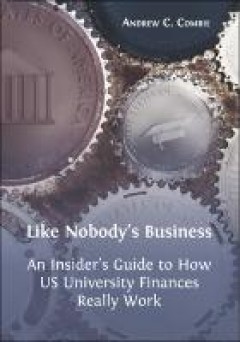
Like nobody's business: an insider's guide to how US University finances rea…
"How do university finances really work? From flagship public research universities to small, private liberal arts colleges, there are few aspects of these institutions associated with more confusion, myths or lack of understanding than how they fund themselves and function in the business of higher education. Using simple, approachable explanations supported by clear illustrations, this book t…
- Edition
- -
- ISBN/ISSN
- 9781800641099
- Collation
- xi, 471 pages (1 online resource) : charts (color)
- Series Title
- -
- Call Number
- 378.38 COM l
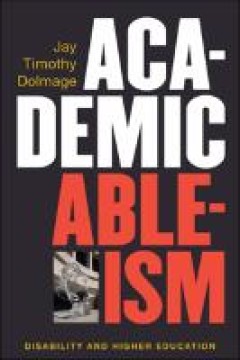
Academic ableism: Disability and Higher Education
Academic Ableism brings together disability studies and institutional critique to recognize the ways that disability is composed in and by higher education, and rewrites the spaces, times, and economies of disability in higher education to place disability front and center. For too long, argues Jay Timothy Dolmage, disability has been constructed as the antithesis of higher education, often pos…
- Edition
- -
- ISBN/ISSN
- 9780472123414
- Collation
- x, 244p.: ill.
- Series Title
- -
- Call Number
- 378.0087 DOL a
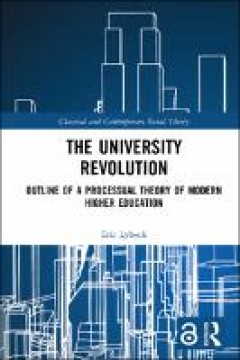
The university revolution : outline of a processual theory of modern higher e…
Few institutions in modern society are as significant as universities, yet our historical and sociological understanding of the role of higher education has not been substantially updated for decades. By revisiting the emergence and transformation of higher education since 1800 using a novel processual approach, this book recognizes these developments as having been as central to constituting t…
- Edition
- -
- ISBN/ISSN
- 9781351017558
- Collation
- X, 203 p.
- Series Title
- Classical and Contemporary Social Theory,
- Call Number
- 378 LYB u
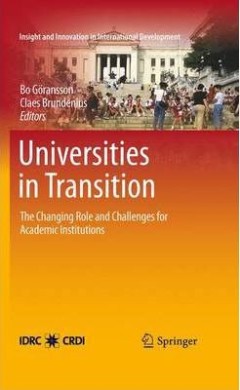
Universitas in transition: the changing role and challenges for academic inst…
Globalization, the information age, and the rise of the knowledge-based economy are significantly transforming the way we acquire, disseminate, and transform knowledge. And, as a result, knowledge production is becoming closer and more directly linked to economic competitiveness. This evolution is also putting new and urgent demands on academic institutions to adjust to the changing needs of so…
- Edition
- -
- ISBN/ISSN
- 9781552505052
- Collation
- viii, 366 p.
- Series Title
- -
- Call Number
- 378.013 UNI u
 Computer Science, Information & General Works
Computer Science, Information & General Works  Philosophy & Psychology
Philosophy & Psychology  Religion
Religion  Social Sciences
Social Sciences  Language
Language  Pure Science
Pure Science  Applied Sciences
Applied Sciences  Art & Recreation
Art & Recreation  Literature
Literature  History & Geography
History & Geography